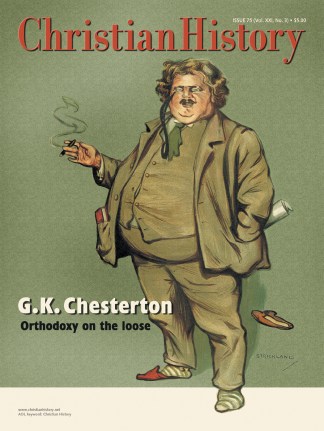From his pen
One longtime fan of Chesterton acknowledges that learning to read him is a bit like learning a second language. Once the language is learned, though, the rewards start pouring in.
The best place to begin reading Chesterton is his Autobiography. This book gives the gist of his life, but even more so the gist of his style and thought. It’s a great place to learn the language.
The second round of reading consists of Heretics, Orthodoxy, and The Blatchford Controversies, gathered in volume 1 of the Ignatius Press Collected Works. The Blatchford essays appear last in this edition, but they were actually written first and provide a good introduction to the other two books.
At least four reading tracks proceed from here.
The fiction track includes Father Brown stories and the novels Manalive, The Napoleon of Notting Hill, The Flying Inn, and The Return of Don Quixote. Brave souls who wish to tackle The Man Who Was Thursday may want to check out The Annotated Thursday, edited by Martin Gardner (Ignatius, 1999).
For a poetry side-trip, add The Ballad of the White Horse. Ignatius Press reissued the tenth edition of this historical verse epic, with reproductions of Robert Austin’s 1928 woodcuts, in 2001.
The theology track takes in The Everlasting Man, St. Francis of Assisi, St. Thomas Aquinas, and The Well and the Shallows.
What’s Wrong with the World, The Outline of Sanity, and A Short History of England provide a good entree to Chesterton’s social and cultural commentary. His newspaper columns offer more examples. These can be found in collections and floating around online. IHS Press reprinted The Outline of Sanity, a key distributist text, in 2001.
Highlights of Chesterton’s literary criticism include The Victorian Age in Literature and his works on Dickens and Chaucer.
Several of Chesterton’s best-known works are now available on audiocassette or as e-books. A remarkable array of Chesterton’s publications-from short stories, poems, and essays to some whole books-also appears online. Martin Ward collects links to these works and posts them at www.dur.ac.uk/-dcs6mpw/gkc/books/.
From his fans
A long line of Chesterton biographies began with his friend Maisie Ward’s official Chesterton (Sheed & Ward, 1943). Joseph Pearce’s Wisdom and Innocence: A Life of G.K. Chesterton (Ignatius, 1997) is a high-quality entry of more recent vintage. Garry Wills’s Chesterton (Image, 2001) takes a different tack, focusing on the author’s literary development rather than the chronology of his life. The Chesterton Review, edited by Ian Boyd and distributed in North America by the Intercollegiate Studies Institute, features scholarly, though readable, essays on Chesterton and his literary peers, as well as some unpublished pieces by Chesterton.
Perhaps as a tribute to Chesterton’s wide writing range, books that explore his views include both monographs and essay collections. Some of the most helpful books include The Christian Imagination: G.K. Chesterton on the Arts by Thomas C. Peters (Ignatius, 2000); The Universe and Mr. Chesterton by Randall Paine (Sherwood Sugden & Co., 1999); The Novels of G.K. Chesterton by Ian Boyd (out of print); and Chesterton and the Edwardian Cultural Crisis by John D. Coates (Hull University Press, 1984).
Schall on Chesterton: Timely Essays on Timeless Paradoxes (Catholic University of America, 2000) falls into the second category. Author James V. Schall, S.J., attempts to capture Chesterton’s style and spirit as well as his ideas.
The Gift of Wonder, edited by Dale Ahlquist of the American Chesterton Society (see page 18), features essays on many facets of Chesterton’s character and beliefs. The society’s website, www.chesterton.org, and magazine, Gilbert!, are also great resources.
Copyright © 2002 by the author or Christianity Today/Christian History magazine.Click here for reprint information on Christian History.










